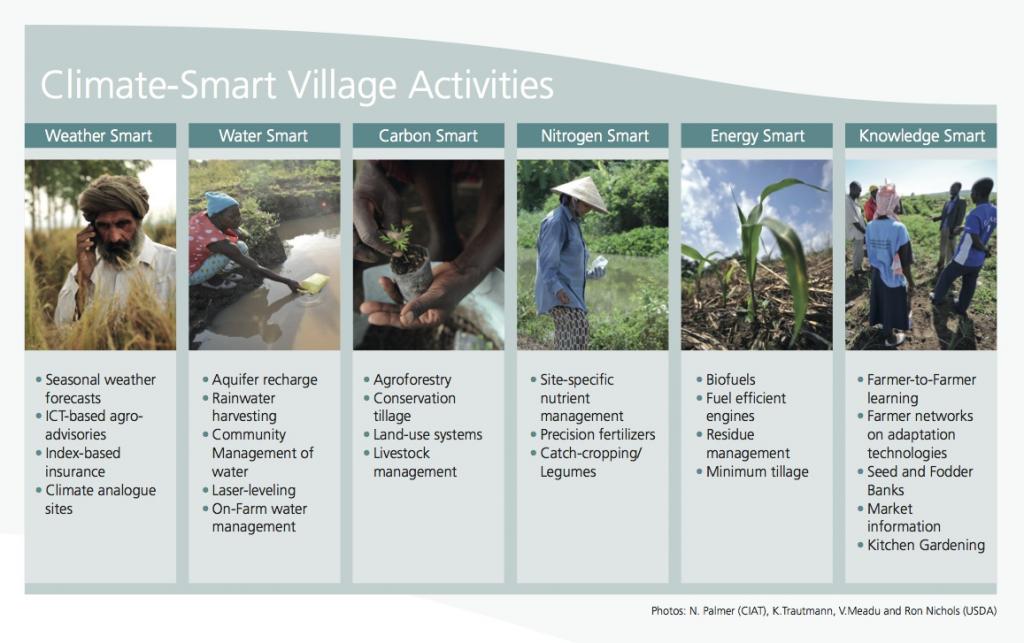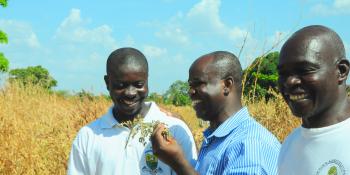Africa could take the lead on climate-smart agriculture

Thanks to Africa's size, interest in enhancing agricultural productivity, large uncultivated areas and more, getting climate-smart agriculture practices both tested and scientifically improved on the continent is very much a possibility.
This was one of the hot topics discussed at the 'Climate-Smart Agriculture (CSA)' side event convened during Africa Agriculture Science Week.
There are many channels and activities through which the continent could spearhead climate-smart agriculture practices. One area is via interventions that relate to farm- and tree-interactions such as agroforestry.
Farms combined with trees could provide many potential solutions
Of all the regions in the world, Africa offers the best chance for balancing land use between forestry and agriculture to come together in a mutually supportive way. This said Dr. Sonja Vermeulen CCAFS Head of Research during her presentation.
As many African countries suffer from poor soil quality and degradation, estimates show that 75 percent of the Sub-Saharan arable land has soil fertility problems, planting trees or using existing vegetation could help moisturize the soil while boosting crop productivity and climate resilience.
But we need better interactions between the agriculture and forestry sectors to make this work.
Introducing climate-smart agriculture at the farm level
As climate-smart agriculture happens at multiple scales, one key entry point for working with CSA is at the farm and community level.
Climate change doesn’t affect farmers as an isolated problem. Instead we need to fit climate change into the bigger picture - Sonja Vermeulen
CCAFS is right now working with farmers in various sites in West Africa and East Africa, testing a variety of climate-smart activities that have been chosen specifically to fit these areas.
Our ‘Climate-Smart Village model’ works with farmers, researchers, policy makers and extension workers, just to mention a few, in empowering farmers to use new 'climate-smart' tools and techniques. Selected tools could help farmers improve their livelihoods and climate resilience.
Learn more: What are Climate-Smart Villages?
The model is a long-term project and involve multiple ‘climate-smart’ activities that farmers find useful.
Challenge is how to be smart with climate change, when many effects are still unknown? Unsurprisingly, this is not an easy endeavour! However, something needs to be done as there is no excuse for not adapting to emerging climate change just because effects are uncertain - there is still much that can be done.
Read more: No excuses, no regrets: we can adapt agriculture to climate change now
We try to find activities that maximise the synergies of adaptation and resilience building, climate mitigation, and diversification of livelihoods while keeping farmers' true needs at the heart of any activity:
Other examples where Africa could take the lead on climate-smart activities are via innovative platforms - to learn from each others.
Dr. Vermeulen mentioned climate information and forecasts as one area where countries could take the lead on, and are already doing so, by creating innovative partnership platforms for sharing information.
For example, the CGIAR Research Program on Climate Change, Agriculture and Food Security (CCAFS) is working closely with the West African Science Service Center on Climate Change and Adapted Land Use (WASCAL) which is working on providing climate forecasting services for the West Africa region. Other innovative projects include the Coordinated Regional Climate Downscaling Experiment (CORDEX) and AMMA, an international programme dealing with the West African Monsoon.
Example of a platform initiative: West African countries chart plans to improve climate information for farmers
Working with farmers doesn’t take away from the fact that engaging with countries on a national level and coordinating global support are also key activities when implementing, improving and scaling-up climate-smart agriculture.
In her presentation (below), Dr Vermeulen reflected on how Africa can, and already is, providing much needed data from the continent related to climate change and agriculture. This data can in turn can be fed into the climate-smart agriculture discourse and practice in international negotiations and policy discussions.
The side event on Climate-Smart Agriculture was convened by the Forum for Agricultural Research in Africa (FARA).




